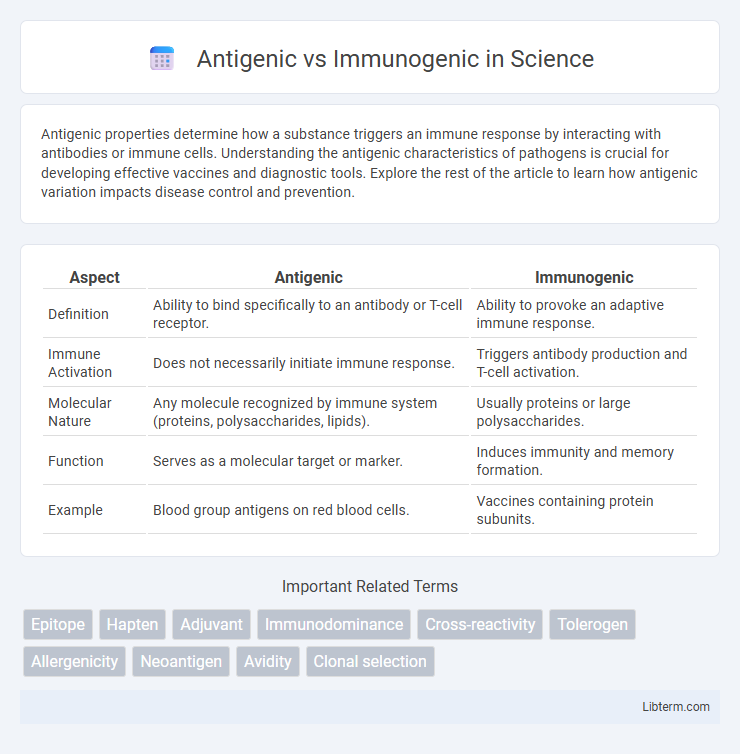Antigenic properties determine how a substance triggers an immune response by interacting with antibodies or immune cells. Understanding the antigenic characteristics of pathogens is crucial for developing effective vaccines and diagnostic tools. Explore the rest of the article to learn how antigenic variation impacts disease control and prevention.
Table of Comparison
| Aspect | Antigenic | Immunogenic |
|---|---|---|
| Definition | Ability to bind specifically to an antibody or T-cell receptor. | Ability to provoke an adaptive immune response. |
| Immune Activation | Does not necessarily initiate immune response. | Triggers antibody production and T-cell activation. |
| Molecular Nature | Any molecule recognized by immune system (proteins, polysaccharides, lipids). | Usually proteins or large polysaccharides. |
| Function | Serves as a molecular target or marker. | Induces immunity and memory formation. |
| Example | Blood group antigens on red blood cells. | Vaccines containing protein subunits. |
Understanding Antigenicity and Immunogenicity
Antigenicity refers to the ability of a substance to specifically bind to immune receptors like antibodies or T-cell receptors, which is crucial for immune recognition. Immunogenicity is the ability of that substance to elicit an immune response, involving activation of lymphocytes and the production of memory cells. Understanding the distinction between antigenic determinants (epitopes) and the overall immunogenic potential of an antigen informs vaccine design and therapeutic strategies.
Key Differences: Antigenic vs Immunogenic
Antigenic refers to the ability of a substance, such as a protein or polysaccharide, to specifically bind to antibodies or T-cell receptors, indicating its potential to be recognized by the immune system. Immunogenicity describes the capacity of that substance to provoke a full immune response, including the activation and proliferation of immune cells. The key difference lies in antigenicity being about recognition, while immunogenicity involves the actual stimulation of an adaptive immune response.
How Antigens Trigger Immune Responses
Antigens are molecules recognized by the immune system that can stimulate an immune response by binding specifically to antibodies or receptors on immune cells. When an antigen is detected, it activates immune cells such as B cells and T cells, triggering the production of antibodies and initiating cellular immunity. The immunogenicity of an antigen depends on its molecular structure, size, and ability to be processed and presented by antigen-presenting cells to activate a targeted immune reaction.
Immunogenicity: Definition and Significance
Immunogenicity refers to the ability of a substance, such as an antigen, to provoke an adaptive immune response by stimulating the production of antibodies or activating T-cells. It is a critical property for vaccine development, ensuring that the immune system can recognize and remember the pathogen for future protection. Understanding immunogenicity helps in designing effective immunotherapies and improving clinical outcomes in infectious diseases and cancer.
Factors Affecting Antigenicity
Antigenicity is influenced by factors such as molecular size, complexity, and foreignness to the host immune system, while immunogenicity depends not only on these but also on the ability to activate immune cells effectively. Larger molecules, particularly proteins with complex structures, tend to have higher antigenic properties, triggering recognition by antibodies. The presence of adjuvants, route of exposure, and host genetic factors also modulate the immunogenic potential of an antigen, affecting vaccine design and immune response efficacy.
Factors Influencing Immunogenicity
Immunogenicity depends on several factors including the molecular size, complexity, and foreignness of an antigen, as larger and more complex proteins typically trigger stronger immune responses. The chemical composition and heterogeneity of the antigen influence its ability to be recognized by immune cells, with polysaccharides generally being less immunogenic than proteins. The host's genetic makeup, route of antigen administration, and presence of adjuvants also significantly impact the overall immunogenic potential, distinguishing true immunogens from mere antigenic substances.
Types of Antigens and Their Roles
Antigens are categorized into exogenous, endogenous, and autoantigens, each playing distinct roles in immune recognition and response; exogenous antigens originate outside the body, triggering antibody production, while endogenous antigens arise from within affected cells, signaling cytotoxic T cell activation. Immunogenicity refers to an antigen's ability to provoke a robust immune response, dependent on factors like molecular size, complexity, and foreignness, whereas antigenicity describes the ability to bind specifically to immune receptors without necessarily inducing a response. Understanding types of antigens--including complete proteins, haptens, and superantigens--clarifies their varied functions in immune activation, tolerance, or hypersensitivity reactions.
Clinical Relevance: Vaccines and Therapies
Antigenic properties refer to the ability of a substance to specifically bind to an antibody or a T-cell receptor, which is crucial for identifying pathogens during immune responses. Immunogenicity encompasses the capacity to provoke a robust and lasting immune response, essential for the efficacy of vaccines and immunotherapies. Understanding the distinction between antigenic and immunogenic characteristics guides the design of vaccines and therapeutic agents to enhance protective immunity and clinical outcomes.
Methods to Measure Antigenicity and Immunogenicity
Enzyme-linked immunosorbent assays (ELISA) and western blotting are commonly used to measure antigenicity by detecting specific antigen-antibody interactions. Immunogenicity is often assessed through in vivo studies, including animal immunization models, to evaluate the ability of a substance to induce an immune response by measuring antibody titers and T-cell proliferation. Flow cytometry and cytokine profiling further quantify immunogenic effects by analyzing immune cell activation and cytokine release patterns.
Challenges and Future Perspectives
Understanding the distinction between antigenic and immunogenic properties is crucial for vaccine development, as antigens may bind to immune receptors without necessarily eliciting a strong immune response, presenting a challenge in designing effective immunotherapies. Future perspectives emphasize the integration of advanced bioinformatics and immunoinformatics tools to identify epitopes that enhance immunogenicity while minimizing adverse reactions. Innovations in nanoparticle delivery systems and synthetic biology hold promise for overcoming current limitations by improving antigen presentation and stimulating robust, targeted immune responses.
Antigenic Infographic

 libterm.com
libterm.com